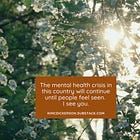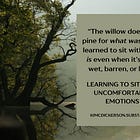Backward Facing Therapy contains soulful + insightful stories from my time as a therapist, and therapy client. Sit by me as we work on our mental health together. Posts are informational and should not be considered a substitute for professional mental health care.
It’s eight a.m. when I step out onto my patio and hear the sounds of spring. Three pairs of red cardinals are chirping as they float between my willow tree and the bird feeder.
The male cardinals sit in the willow while the females eat. Once they return the males take their turn eating the seed I’ve placed out for them.
The color of the birds is striking against the tangled branches of the willow that is yet to fully awaken from a winter slumber.
I can see the fresh green vines sprouting from the tree yet my attention is drawn to the barrenness of the vines.
I normally find great joy in the dance of the cardinals but today all I can feel is a weight in my heart.
It feels familiar and I’m irritated that it’s back. It’s a weight of sadness combined with feelings of uncertainty and anxiety.
I take a deep breath and try to focus in on any thoughts that I’m having.
“We’re sorry to inform you that the research study you’ve been participating in has been cancelled due to funding cuts.”
The three year DNA/Multiple Sclerosis research study that I was participating in was cancelled which meant I would not be receiving my genetic research results.
Another email titled, MS Research Program (MSRP) Unfunded in FY 25 by Congress.
Federal cuts gut food banks as they face record demand.
Changes at Social Security Administration may impact customer service, benefit payments, experts say.
As a person with Multiple Sclerosis who relies on Social Security Disability, food pantries, and Medicare/Medicaid, this isn’t about politics, this is about survival.
Tariffs on. Tariffs off. Tariffs on.
No wonder I’m feeling a weight in my heart.
There’s a lot of uncertainty, anxiety, and turmoil in the world. If it’s not affecting you, it’s probably affecting someone you love.
So what do I do with this weight?
First, I remind myself that my brain, body, and emotions are constantly adapting and this weight will not be present forever.
Just like joy, sadness and anxiety is part of the human experience. Even though the weight is uncomfortable, we need to learn how to sit with it.
Second, because I’m a therapist, and have been to therapy, I rely on therapeutic strategies I’ve learned to help me stay grounded, resilient, and connected (even when the world feels too much).
7 Therapeutic Strategies To Help You During Times of Uncertainty
1. Set Intentional Boundaries with Media
Consuming everything isn’t the same as being informed. In fact, doomscrolling can dysregulate your nervous system and amplify anxiety. Choose when and how you engage with the news. There’s a balance between staying informed and becoming consumed. Your nervous system will let you know when it’s had too much. For me, it’s the weight in my heart and the return of anxiety.
2. Name What You Feel
You might feel grief one moment, rage the next, then deep fatigue. These are normal human responses to abnormal times. Naming your emotions helps regulate them. Write them down, speak them aloud, or talk to someone you trust. Don’t minimize what you feel.
3. Take Action, However Small
When we feel helpless, action—even symbolic—restores a sense of agency. Whether it’s donating, signing a petition, checking on a neighbor, or showing up in community, small acts remind you: I can still make a difference. I started using the 5 Calls website and it’s reinforced how powerful it is when a large group of people do small things together.
4. Create Daily Anchors
In therapy, we talk about rituals of safety—small, predictable routines that ground us. Light a candle each morning. Take a walk at the same time daily. Drink your tea slowly. In a chaotic world, these acts become quiet declarations: I’m still here. I can still care for myself. Living in the present moment is an act of defiance amidst the chaos.
5. Connect Instead of Withdrawing
When the world feels unstable, many people isolate. But healing can happen in connection. Reach out to someone. Even a brief check-in can create a shared sense of safety. You don’t have to have the right words—your presence is enough.
6. Make Time For Extracurriculars
It sounds cliche but making time to do the things you enjoy helps relieve stress, anxiety, and even increases the feel good chemicals in your brain. Whether it’s reading a book, knitting, playing pickleball, or watching old movies, your body and brain need this time to decompress.
7. Nature Therapy
Whether it’s a single tree, an entire park, a body of water, or a bench beneath the sunshine, spending time in nature can be a balm to your mood and mind. You may not feel the change right away but over time, you’ll realize that the changes in nature are similar to your own. They might not be visible but they’re happening beneath the surface.
If you’re struggling, you don’t need to force happiness. You don’t have to go from overwhelmed to peaceful overnight but you *can* feel different.
A little lighter. A little clearer. A little more like yourself again.
Anxiety can soften.
Uncertainty can feel less paralyzing.
Sadness can become more manageable.
Even if nothing external changes, your internal experience *can* shift—sometimes in just a few days.
The red cardinals sure were beautiful this morning.
“In order to see birds it is necessary to become a part of the silence.”
― Robert Lynd
Journal Prompts:
→ What is one small step I can take today to move forward, even if it’s just being kind to myself?
→ Write about a time when you faced a challenge and got through it. What helped you? What did you learn about yourself?
Which of the seven therapeutic strategies resonate with you the most?
Be well, friends,
Kim
Becoming a paid subscriber is the best way to support my work, but you can also buy me a coffee or send a dose of mindfulness. Shares, likes and comments are also a way to show your support. Either way, I’m glad you’re here.
As a reminder, paid subscribers get access to our growing library in Kim’s Therapy Space.











Kim, so sorry about the medical study being cancelled. It's been one insult after another.